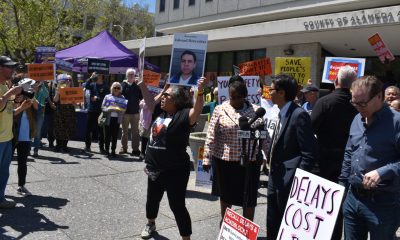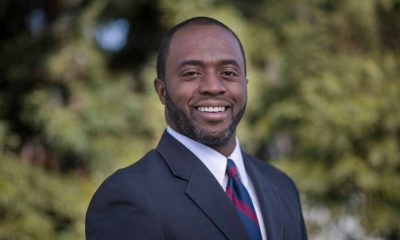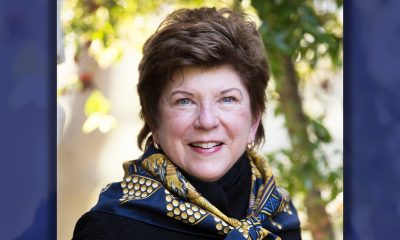Bay Area
Oakland Program Distributes $500 to Families of Color
The assistance, which targets low-income families of color in the 426,000-population city, will last 18 months. Mayor Schaaf detailed that the money comes with “no-strings attached,” and recipients can use it as they please. “We have designed this demonstration project to add to the body of evidence and to begin this relentless campaign to adopt a guaranteed income federally,” Mayor Schaaf told the local ABC News station.

In the middle of a worldwide awakening to the centuries-old racism and oppression suffered by Black people, some African Americans finally see tangible assistance – even if the help isn’t characterized as reparations.
Oakland, Calif., Mayor Libby Schaaf announced that the city would begin a guaranteed income project that would provide $500 per month to Black and Indigenous families.
The assistance, which targets low-income families of color in the 426,000-population city, will last 18 months.
Mayor Schaaf detailed that the money comes with “no-strings attached,” and recipients can use it as they please.
“We have designed this demonstration project to add to the body of evidence and to begin this relentless campaign to adopt a guaranteed income federally,” Mayor Schaaf told the local ABC News station.
The station reported that, for the project, the Oakland Resilient Families program has so far raised $6.75 million from private donors, including Blue Meridian Partners, a national philanthropy group.
The programs require residents have at least one child under 18 and income at or below 50 percent of the area median income – about $59,000 per year for a family of three.
Half the spots are reserved for people who earn below 138 percent of the federal poverty level or about $30,000 per year for a family of three, ABC reported. Participants are randomly selected from a pool of applicants who meet the eligibility requirements.
The report noted that Oakland’s project is significant because it is one of the most outstanding efforts in the U.S. so far, targeting up to 600 families. And it is the first program to limit participation strictly to Black, Indigenous, and people of color communities.
Oakland, where 24 percent of the residents are Black, is among a growing list of municipalities providing financial payments to people of color – or reparations.
Evanston, Illinois, a city where 18 percent of its more than 74,500 residents are Black, approved the Local Reparations Restorative Housing Program, which provides up to $25,000 for housing down payments or home repairs to African Americans.
The bill, authored by California Assemblywoman Shirley Weber, establishes a nine-person task force that will study the impact of the slave trade on Black people.
It does not commit to any specific payment, but the task force will make recommendations to legislators about what kind of compensation should be provided, who should receive it, and what form it would take.
“After watching [the presidential] debate, this signing can’t come too soon,” Newsom declared during a videoconference with lawmakers and other stakeholders, including the rapper Ice Cube, who championed the bill.
“As a nation, we can only truly thrive when every one of us has the opportunity to thrive. Our painful history of slavery has evolved into structural racism and bias built into and permeating throughout our democratic and economic institutions,” the governor stated.
“Hundreds of years of Black blood spilled that fills the cup we drink from today,” said Councilman Keith Young, one of two African American members of the City Council that voted 7-0 in favor of reparations.
“It is simply not enough to remove statutes. Black people in this country are dealing with systemic issues,” Young declared.
Asheville’s resolution doesn’t include monetary payments to African Americans but promises investments in areas where Black people face disparities.
Earlier this year, Congress debated H.R. 40, a bill that doesn’t place a specific monetary value on reparations but focuses on investigating and presenting the facts and truth about the unprecedented centuries of brutal enslavement of African people, racial healing, and transformation.
The commission’s mission includes identifying the role of federal and state governments in supporting the institution of slavery, forms of discrimination in public and private sectors against freed slaves and their descendants, and lingering adverse effects of slavery on living African Americans and society.
Congresswoman Jackson Lee, who sits on numerous House committees, including the Judiciary, Budget, and Homeland Security, has made the reparations legislation her top priority during the 117th Congress.
“I think if people begin to associate this legislation with what happened to the descendants of enslaved Africans as a human rights violation, the sordid past that violated the human rights of all of us who are descendants of enslaved Africans, I think that we can find common ground to pass this legislation,” Congresswoman Jackson Lee pronounced.
The project in Oakland targets groups with the city’s most significant wealth disparities.
According to CNN and per the Oakland Equality Index, the median income for White households in Oakland to be nearly three times that of Black homes.
“The poverty we all witness today is not a personal failure. It is a systems failure,” Schaaf remarked. “Guaranteed income is one of the most promising tools for systems change, racial equity, and economic mobility we’ve seen in decades.”
Two years ago, 100 residents in Stockton, California, began receiving unconditional $500 payments, CNN reported. Other initiatives in Newark, New Jersey, and Atlanta, Georgia, were launched as recently as 2020.
Former Stockton Mayor, Michael Tubbs, is the founder of Mayors for a Guaranteed Income, a network of advocating mayors founded in 2020.
Oakland Mayor Schaaf is also a founding member of the network.
“One of my hopes in testing out a guaranteed income is that other cities would follow suit, and I’m thrilled that Oakland is among the first,” Tubbs told CNN.
“By focusing on BIPOC residents, the Oakland Resilient Families program will provide critical financial support to those hardest hit by systemic inequities, including the pandemic’s disproportionate toll on communities of color.”
Alameda County
Board of Supervisors Accepts Certification of Signatures, Will Schedule Recall Election May 14
The Alameda Board of Supervisors unanimously accepted the certification of the results of the valid signatures submitted for the recall of District Attorney Pamela Price on Tuesday evening. The Board will set the election date at a special meeting on May 14. Before the meeting, recall proponents and opponents held separate press conferences to plead their cases to the Board and residents of Alameda County.
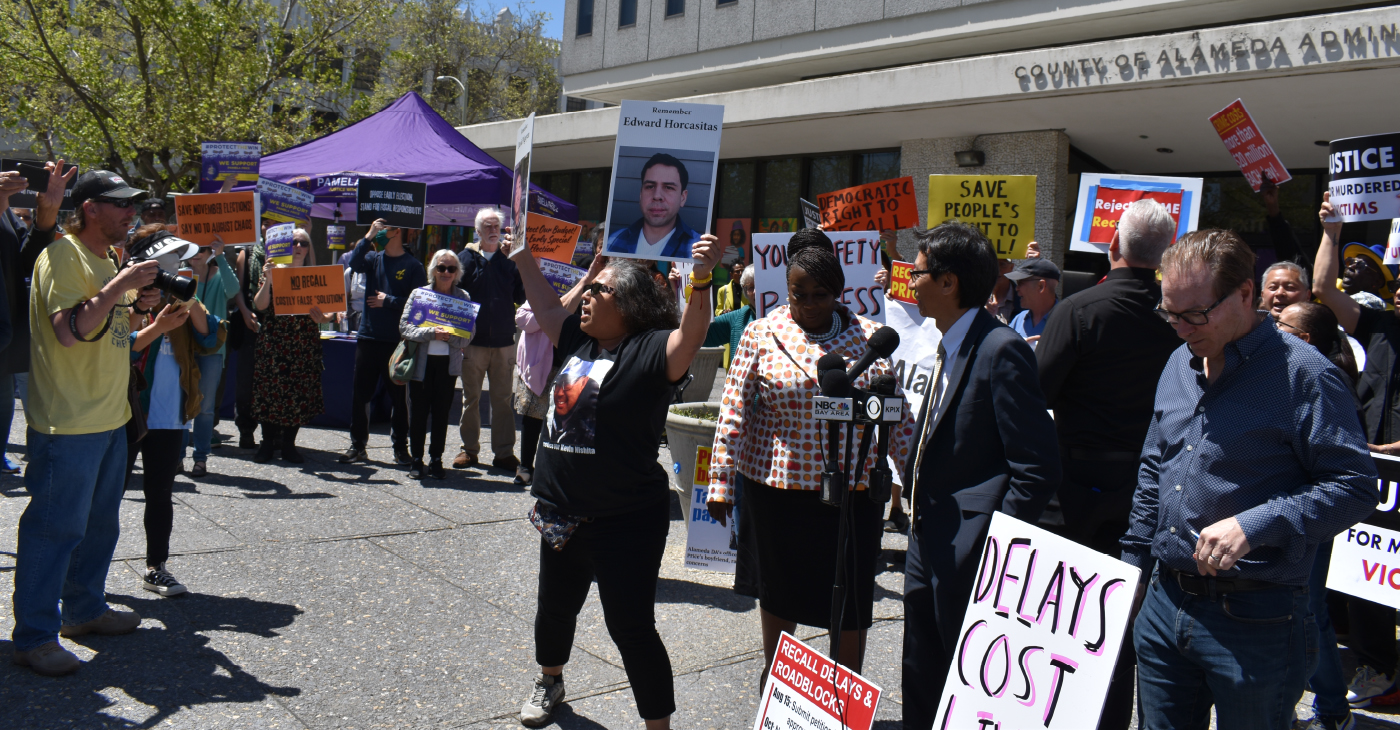
By Magaly Muñoz
The Alameda Board of Supervisors unanimously accepted the certification of the results of the valid signatures submitted for the recall of District Attorney Pamela Price on Tuesday evening. The Board will set the election date at a special meeting on May 14.
Before the meeting, recall proponents and opponents held separate press conferences to plead their cases to the Board and residents of Alameda County.
Price, who up until this point has made little public comment about the recall, held her press conference in Jack London to announce that the California Fair Political Practices Commission has opened an investigation into the finances of the Save Alameda For Everyone (SAFE) recall campaign.
The political action committee (PAC), Reviving the Bay Area, has been the largest contributor to the SAFE organization and has allegedly donated over half a million dollars to the recall efforts.
“Between September 2023 and November 2023, [Revive the Bay Area] donated approximately $578,000 to SAFE without complying with the laws that govern all political committees in California,” Price said.
Price accused the recall campaigns of using irregular signature-gathering processes, such as paying gatherers per signature, and using misleading information to get people to sign their petitions.
SAFE held their own press conference outside of the Alameda County Administration Building at 1221 Oak St. in Oakland, once again calling for the Board to certify their signatures and set a date for the recall election.
Their press conference turned contentious quickly as Price’s “Protect the Win” supporters attempted to yell over the SAFE staff and volunteers. “Stop scapegoating Price” and “Recall Price” chants went on for several moments at a time during this event.
Families of victims urged the Board to think of their loved ones whose lives are worth much more than the millions of dollars that many opponents of the recall say is too much to spend on a special election.
The Registrar of Voters (ROV) estimates the special election could cost anywhere from $15 to $20 million, an amount that is not in their budget.
The Board was presented with several options on when and how to conduct the recall election. They have to set a date no less than 88 days or more than 125 days after May 14, meaning the date could fall anywhere from late July to September.
But the County charter also states that if a general election takes place within 180 days of their scheduling deadline, the Board could choose to use the November ballot as a way to consolidate the two events.
In the event that Price is recalled, the Supervisors would appoint someone to fill the vacancy, though neither the County nor the California charter specifies how long they would have to pick a replacement.
The appointee would serve as district attorney spot until the next election in 2026. Afterwards, either they, if they run and win, or a newly elected candidate would serve the rest of Price’s six-year term until 2029. Price is unique as the only district attorney wo serves a term of six years.
The Board acknowledged that they knew last fall that this recall would come with its own set of complications when Measure B, which changed the local recall charter to match California’s, was first brought to their consideration.
Supervisors Nate Miley and David Haubert opposed discussing the measure, stating that the public would think that the Board was attempting to influence the recall campaign that had already taken off months prior.
“I think ultimately this feels like it’s going to end up in court, one way or the other, depending on who files what,” Haubert said.
Price’s legal team told the Post that the district attorney intended to consider all legal options should the recall election take place.
Miley stated that while he was in support of the amendment to the charter, he did not think it was right to schedule it for the March ballot as it would ultimately cause confusion for everyone involved.
“It has produced some legal entanglements that I think, potentially, could’ve been avoided,” Miley said.
Bay Area
Obituary: Former California Education Superintendent Delaine Eastin Passes at 76
Delaine Eastin, who served as a former state Assemblymember representing parts of Santa Clara and Alameda County — and the first woman elected as State Superintendent of Public Instruction — died at age 76 on April 23. Eastin passed away from complications caused by a stroke.
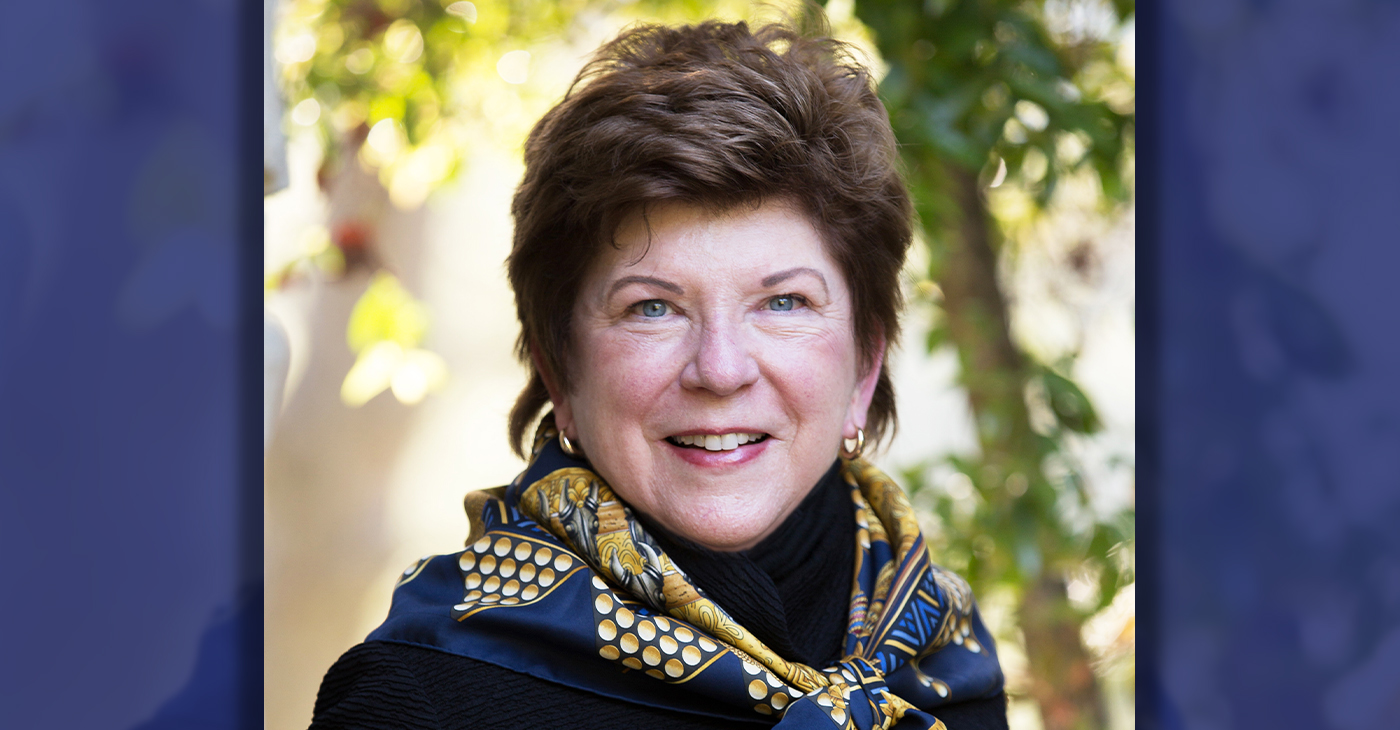
By California Black Media
Delaine Eastin, who served as a former state Assemblymember representing parts of Santa Clara and Alameda County — and the first woman elected as State Superintendent of Public Instruction — died at age 76 on April 23.
Eastin passed away from complications caused by a stroke.
Known for her power of persuasion, Eastin used her influence to be a champion for bipartisan issues that helped raise academic standards, lower class sizes, and emphasize the importance of conserving nature and the environment in schools.
Former Assembly Speaker Willie Brown and fellow legislative colleagues said that Eastin was in demand on the speech circuit while serving as a legislator.
“Few could engender the kind of emotion and passion she delivered in every speech,” Brown said.
State superintendent Tony Thurmond called Eastin a trailblazer who inspired fellow public servants.
“California lost an icon in our school system today. Delaine Eastin’s legacy as a trailblazer in public education will forever inspire us. Her unwavering dedication to California students — from championing Universal Preschool and the “A Garden in Every School” program to honoring our educators by establishing the California Teachers of the Year Awards — has left an indelible mark on our state’s educational landscape,” said Thurmond.
Thurmond honored Eastin’s legacy at the California Teacher of the Year Program, an honor that she established during her time as superintendent.
Bay Area
Zefer O’Neal Ward, 105
Zefer O’Neal Ward transitioned from this life on Feb. 19. She was 105 years old. A native of Pine Bluff, Arkansas, Zefer was the sixth of George and Zora O’Neal’s 14 children. Her joy of singing began at home at the tender age of 4 by being placed on a table and being asked to sing a song. By age 13, she was a member and directress of the youth choir at St. Paul Baptist Church. Zefer attended Merrill High School and Arkansas State College in Pine Bluff, Arkansas.
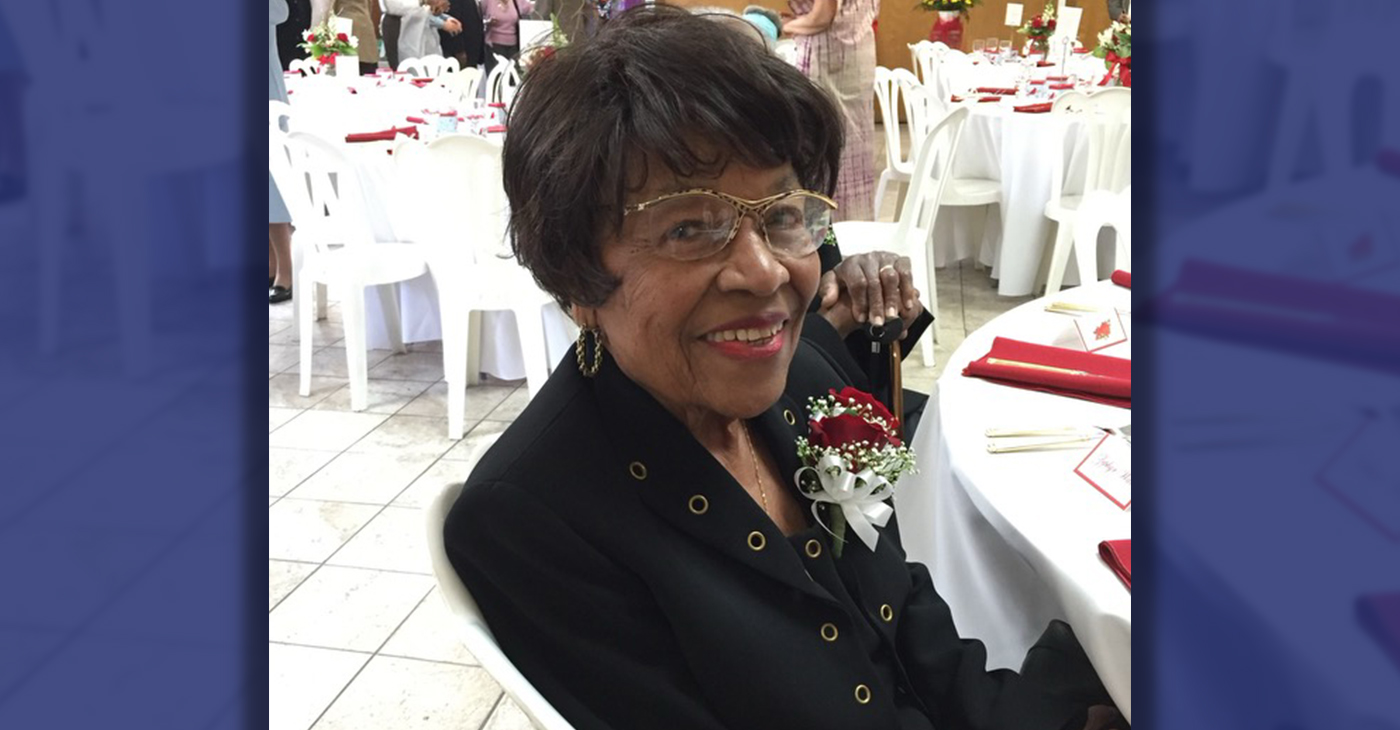
By Post Staff
Zefer O’Neal Ward transitioned from this life on Feb. 19. She was 105 years old. A native of Pine Bluff, Arkansas, Zefer was the sixth of George and Zora O’Neal’s 14 children. Her joy of singing began at home at the tender age of 4 by being placed on a table and being asked to sing a song. By age 13, she was a member and directress of the youth choir at St. Paul Baptist Church. Zefer attended Merrill High School and Arkansas State College in Pine Bluff, Arkansas.
In 1945, Zefer made her home in Oakland, California, where she established deep roots. It was in 1950 that she married the late William “Bill” Ward. That same year, she joined Downs Memorial Methodist Church under the esteemed leadership of Rev. Roy C. Nichols, where her angelic voice soon became a cornerstone of the church’s 8:30 a.m. worship service.
She went on to lend her voice and talents to various choirs in the church including the gospel choir and the formulation of the children’s choir under the guidance of the late Rev. Amos Cambric Jr.
Zefer’s gift of song extended far beyond the walls of her church. For decades, she brought solace and inspiration to countless souls through her performances at funerals, weddings, concerts, conventions and church programs throughout the Bay Area.
Her unparalleled artistry even graced the ears of the late Robert F. Kennedy during a performance at the University of California, Berkeley. To quote her, “I have been involved with singing all my life. Singing is a joy for me. Every time I sing, I pray that I will bring joy to someone. I know that the Lord has used me to touch and bless someone … singing is my life, my joy.”
Surviving Zefer are her two children; Norma Ward-Sledge, CEO and co-founder of Progressive Transitions, Inc. a program in Oakland that has become a beacon of hope for women and families affected by domestic violence and human trafficking; and William Wilson, of Raleigh, North Carolina, a retired business owner. She also leaves behind her sister Minnie O’Neal of Dupont, Washington, two grandsons both of Raleigh, North Carolina and a host of nieces and nephews.
In lieu of flowers, the family kindly requests contributions be made to Progressive Transitions, Inc., an organization that Zefer passionately supported.
There will be a “Memorial Tribute to Zefer” at 11 a.m. on Saturday, June 1 at Downs Memorial United Methodist Church, 6026 Idaho St. in Oakland.
A follow-up event, “Celebrating the Legacy of Lady Z,” will be held on June 22 at Z Café, 2735 Broadway Oakland at 2 p.m.
Please RSVP for this event via text or call (510) 917-0666.
-

 Community2 weeks ago
Community2 weeks agoFinancial Assistance Bill for Descendants of Enslaved Persons to Help Them Purchase, Own, or Maintain a Home
-

 Activism4 weeks ago
Activism4 weeks agoOakland Post: Week of April 3 – 6, 2024
-

 Business2 weeks ago
Business2 weeks agoV.P. Kamala Harris: Americans With Criminal Records Will Soon Be Eligible for SBA Loans
-

 Activism3 weeks ago
Activism3 weeks agoOakland Post: Week of April 10 – 16, 2024
-

 Community2 weeks ago
Community2 weeks agoAG Bonta Says Oakland School Leaders Should Comply with State Laws to Avoid ‘Disparate Harm’ When Closing or Merging Schools
-

 Community2 weeks ago
Community2 weeks agoOakland WNBA Player to be Inducted Into Hall of Fame
-

 Community2 weeks ago
Community2 weeks agoRichmond Nonprofit Helps Ex-Felons Get Back on Their Feet
-

 Community2 weeks ago
Community2 weeks agoRPAL to Rename Technology Center for Retired Police Captain Arthur Lee Johnson

